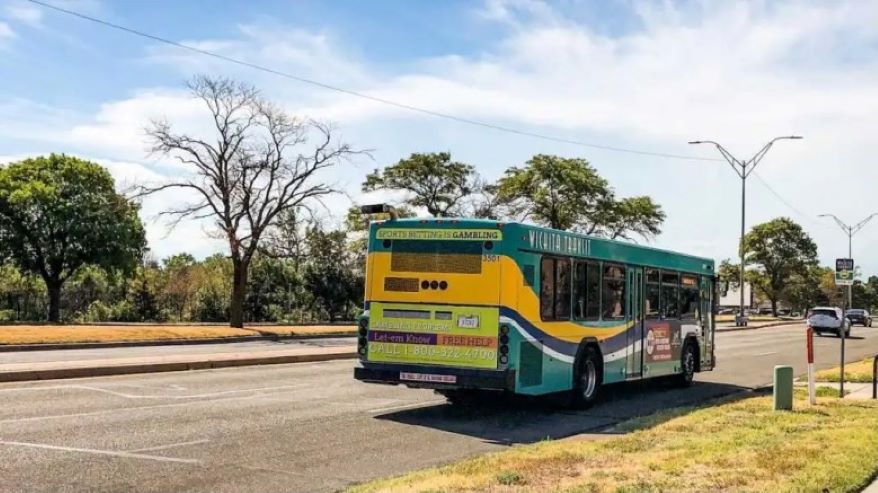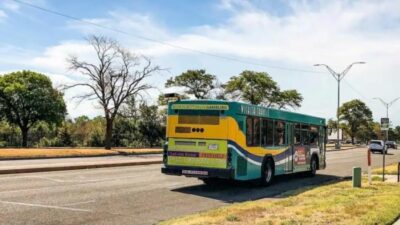Published 6 seconds ago
Above image credit: Gov. Laura Kelly and others officially declare sports betting open on Sept. 1 at the Hollywood Casino-Barstool Sports Sportsbook in Kansas City, Kansas. (Courtesy | Governor’s Office.)
With the arrival of legalized sports betting on Sept. 1, Kansans have a new way to gamble away their money.
A few people will win, most will lose, but the house will always win. Just how much people will lose – and at what social cost – has those who try to help problem gamblers on edge.
“We’re worried that the need (for problem gambling counseling) is going to just increase,” said Stephenie Roberts, a Wichita social worker and certified gambling counselor.
Roberts is chairman of the South Central Problem Gambling Task Force and one of the people callers to 1-800-522-4700 problem gambling hotline are referred to.
“A lot of people who get into serious problems with gambling may develop suicidal thinking, and that’s one of the things we try to address too, make sure people have that help they need when they’re in a crisis,” Roberts said. “Because when you are betting all your money and you suddenly lose it, you get in a very dark place, and having a number you can reach out to to get some help is important.”
Roberts and others in her field believe the funding for addressing problem gambling is grossly inadequate. Under current Kansas law, just 2% of tax revenues generated off gambling at casinos, lottery ticket sales and now sportsbooks is allocated to the Problem Gambling and Addictions Grant Fund.
Roberts’ office gets about $60,000 a year to serve the Wichita metro area and believes that is higher than what the southwest and southeast task forces receive. There was a northeast task force, but Roberts says it’s no longer active. Efforts to reach the northeast’s task force chair, Peter Gusman, were unsuccessful.
Legalized gambling brings major revenue to the state, but the amount allocated to treating problem gambling is minor – and completely dwarfed by the broader collateral social costs of gambling addiction.
Kansas is projected to make $185 million in total tax revenue from gaming and the lottery during the 2022 fiscal year, but only about $8 million will be transferred to the Problem Gambling and Addictions Grant Fund. The fund is projected to have $726,000 on hand at the end of the 2022 fiscal year and another surplus of $532,000 in 2023, according to budget data reported by the Kansas Legislative Research Department.
In 2018, a limited-scope audit report of the Problem Gambling and Addictions Grant Fund found that 32% of the money earmarked by law the previous three years was transferred to other funds that were “not used to provide services to individuals with gambling or other addictions.” Programs and services for problem gambling within the fund fell 54% because staff positions were left vacant, which made it “more difficult to coordinate education and awareness programs which may have led to fewer people seeking treatment.”
In 2020, the National Council on Problem Gambling told the Kansas Legislature the estimated social cost of Kansas adult problem gamblers is $829 million a year, from gambling-related bankruptcy, divorce, crime and job loss. Using the same methodology, adjusting for inflation and the new population census, The Beacon found that problem gambling would incur an estimated cost of $1.126 billion for Kansas taxpayers, families and communities in 2022.
The toll of gambling losses is not readily visible. The governor is the first to place a sports wager in Kansas while wearing the sportsbook’s jacket with its insignia and smiles for the photo-op. The state distributes photos of lottery winners, not losers. At casinos, slot machines make noise when gamblers hit the jackpot. Silence comes with losing. But the impact of a gambling addiction is in full view of bankruptcy lawyers.
Wichita bankruptcy lawyer David Prelle Eron estimates about every 1 in 100 cases he sees involves a problem gambler.
“We’ve seen cases where folks get into trouble with credit cards, or they will take out cash advances and things like that,” Prelle Eron said. “We’ve seen cases where people are operating businesses, and the business ends up failing because they’re pulling money out of the business. Not all debtors with gambling problems gamble in casinos, a lot of them are gambling in poker rooms and things that kind of run underneath the radar.”
Just how many more people might get referred to Roberts after calling the hotline or might Prelle Eron see filing for bankruptcy now that sports betting is added to the mix? The state doesn’t know or doesn’t want to know.
In estimates provided to the Kansas Legislature in April, the Kansas Lottery estimated the state would receive from sports betting revenues $1.8 million in 2023, $6 million in 2024 and $10 million in 2025. But lottery officials say those estimates are already off because the legislation changed after they were made, most notably when the tax rate was proposed at 20% instead of the eventually passed 10%. No new projections have been made since.
The 2017 Kansas Gambling Survey, which determined that 2.7% of Kansas adults are at high risk for suffering from a gambling disorder, will not be administered this year by the Kansas Department for Aging and Disability Services (KDADS) per its five-year rolling schedule.
“Gambling addictions are not a new problem,” a KDADS spokesperson said via email. “As it has done for years, the KDADS will continue promoting and delivering recovery resources for anyone who may see themselves or others facing addiction. KDADS also works with casinos to promote responsible gaming.”
The survey found that of the high-risk group, 52% have had suicidal thoughts and almost 20% have attempted suicide.
“I think it’s important to know what the prevalence and potential of problem gambling is for our state so we know how we were and how we need to provide help resources and treatment for those that truly experience problems with gambling,” said Lisa Chaney, who served as the project lead for the 2017 Kansas Gambling Survey.

More alarmingly, the survey found 42% had never heard of the 1-800-522-4700 gambling helpline but nearly 80% had recalled hearing, reading or watching an advertisement for a casino located in Kansas within the past 12 months of taking the survey.
Casinos and sportsbooks have vastly larger advertising budgets. Ads for sportsbooks alone measure in the hundreds of millions annually nationwide, showing up on television and social media feeds primarily. The problem gambling hotline, meanwhile, is advertised on the back of city buses – one of the lowest-cost advertising avenues available.
“We keep trying to advocate for more for problem gambling because with sports betting coming we’re worried that the need is going to just increase,” Roberts said.
Problem Gambling Help in Kansas
The most common resource for problem gamblers is the national gambling hotline 1-800-522-4700, which will connect you to a local call center and be able to answer any questions you may have and refer you to additional resources in your area. Be aware if you’re a transplant with a non-Kansas area code phone number, as the call center you’re connected to is determined by those three digits. They might not be able to give you the best resources in your area, so make sure to tell them where you’re located.
Gamblers Anonymous also has a hotline, 1-855-222-5542, and your phone number’s area code will also determine who you’re connected with. Gamblers Anonymous has local meetings in Kansas every week that are accessible by clicking here and searching your city, state or ZIP code.
Voluntary Self-exclusion Program
Almost every casino in Kansas has a voluntary self-exclusion list, which gamblers can use to ban themselves from a casino. You can sign up by calling one of the numbers below. Every casino has its own procedures regarding its self-exclusion program, but generally, the gambler will be excluded from entering the casino, cashing checks or using a credit card and will be taken off the casino’s mailing list. A variety of apps, meanwhile, offer to block a user from accessing online gambling sites.
For Kansas state-owned casinos (Hollywood Casino at Kansas Speedway, Kansas Star Casino, Kansas Crossing Casino and Boot Hill Casino): 785-296-5800. Click here to see what a sample application looks like.
Kansas tribal casinos:
- Prairie Band Casino and Resort: 785-966-7660
- Golden Eagle Casino (No self-exclusion program)
- Sac & Fox Casino (No self-exclusion program)
- Casino White Cloud: 877-652-6115
- 7th Street Casino: 913-371-3500
- Crosswinds Casino: 316-768-2000
Marco Schaden is a reporting intern for The Beacon, where this story first appeared. The Beacon is a member of the KC Media Collective.

Related Stories
